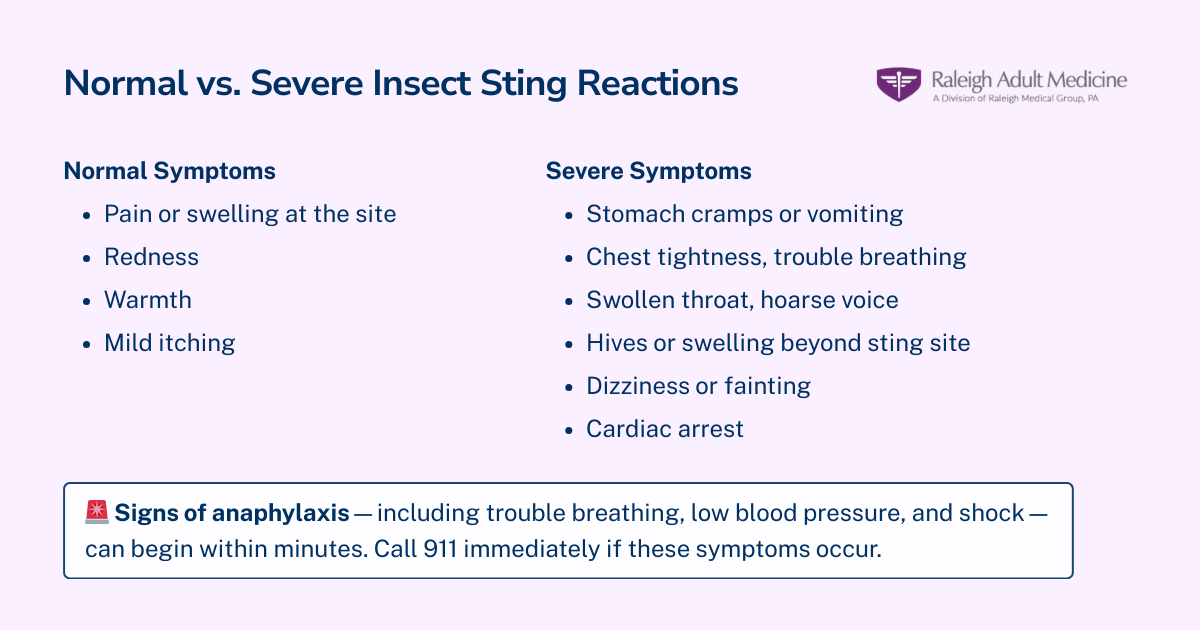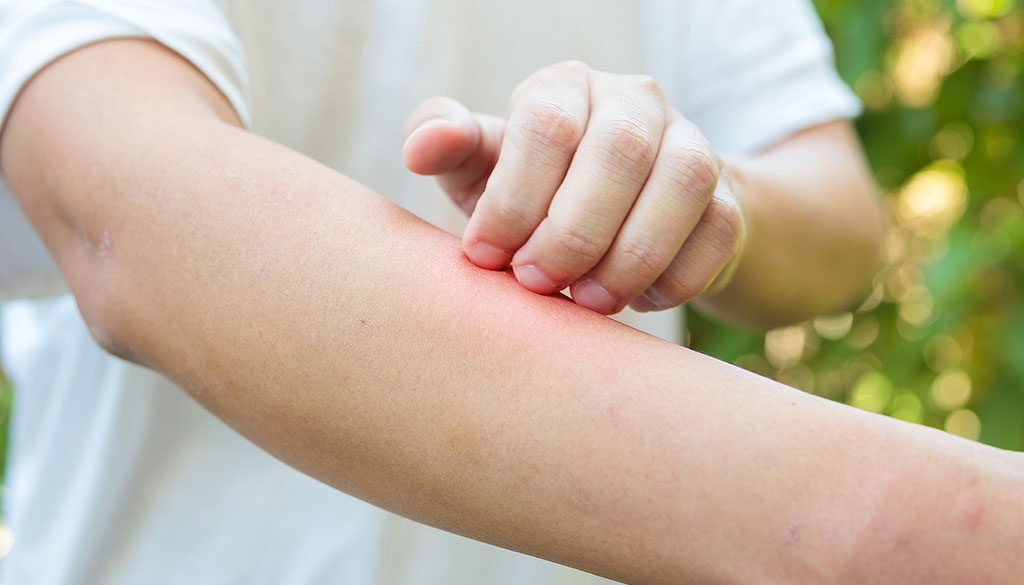Our Guide for Prevention and Emergency Care for Insect Sting Allergies
In this article:
When most people get stung by an insect, what often follows is redness, swelling, itching or other minor symptoms. But for those with an insect sting allergy, much more severe reactions can occur. Recognizing these allergic reactions early can prevent potentially life-threatening consequences.
At Raleigh Adult Medicine, we want you to know that we care about every aspect of your health. That means having compassionate experts who will help you with both chronic, long-term illnesses and more acute issues. We invite you to see why so many select us as their internal medicine physicians in Raleigh. Simply schedule an appointment.
In this article, let’s take a look at severe insect sting reaction symptoms, what you should do if you experience this type of reaction, prevention tips for avoiding stings and treatment options for insect sting allergies.
What Are Normal Insect Sting Reaction Symptoms?
Ordinary insect sting reaction symptoms may include:
- Pain and swelling at the sting site
- Redness of the skin around the sting
- Skin around the sting site that feels warm to the touch
- Itching
These symptoms typically last just a few hours, though in some cases they may last longer.
What Are Severe Insect Sting Reaction Symptoms?
Severe allergic reaction symptoms that require prompt medical attention may include:
- Abdominal cramping
- Vomiting, intense nausea or diarrhea
- Chest tightness and difficulty breathing
- Hoarse voice, swelling of the tongue or throat, or difficulty swallowing
- Hives, itching or swelling in places other than the sting site
Other reactions that require immediate medical attention include:
- Dizziness
- Loss of consciousness
- Cardiac arrest
The most severe allergic reaction is known as anaphylaxis, which can start within minutes after the sting, or be delayed for over an hour.
Anaphylaxis:
- Impairs breathing
- Causes a rapid decrease in blood pressure
- Can send the body into shock
Anaphylaxis is a life-threatening condition that requires immediate emergency medical attention.

What Should You Do If You’re Having a Severe Insect Sting Reaction?
Serious or life-threatening allergic reactions like those described above require immediate medical attention. If you are experiencing severe symptoms, call 911 or have someone else call so you can get emergency care as soon as possible. Hospitalization may be necessary.
Emergency treatment may include:
- Drugs such as:
- Epinephrine
- Antihistamines
- Corticosteroids
- Intravenous fluids
- Oxygen
- Or other remedies
Those with previous allergic reactions may have a prescription for injectable epinephrine to use in these circumstances. Even if your symptoms improve after giving yourself an epinephrine shot, medical attention after an insect sting is recommended.
Do You Have an Underlying Allergy? Talk to Us!
You should also talk with us about preventive treatment of the underlying allergy if you haven’t already. Allergy shots, also known as immunotherapy, can help prevent severe allergic reactions to insect stings in the future. We’ve also helped hundreds of Triangle area residents find relief from seasonal allergies that are so common in North Carolina.
While you may be up to date on your adult immunizations, shots to treat and prevent serious allergic reactions to insect stings are not part of that protocol and require separate treatment.
Can Immunotherapy Treat an Insect Sting Allergy?
If you’ve experienced severe allergic reactions to insect stings in the past, long-lasting protection in the form of allergy shots, or immunotherapy, may offer relief. Allergy shots can help you build tolerance to insect venom and provide up to 98% protection against future stings. Long-term treatment of insect sting allergies is called venom immunotherapy.
How Does Venom Immunotherapy Work?
Venom immunotherapy is administered by an allergist. It involves gradually increasing doses of the venom that triggers your allergic reaction to decrease your sensitivity to it.
Your allergist will determine how often you need to receive injections and the total treatment duration. The result is long-lasting symptom relief that continues after the series of shots have ended.
Immunotherapy for insect sting allergies may involve a series of injections over several years. Depending on your past history with insect stings, your allergist may also prescribe an epinephrine auto-injector to treat severe allergic reactions.
What Insect Stings Most Commonly Cause Allergic Reactions?
Most allergic reactions to stings are caused by venom from insects in the Hymenoptera family, which include honeybees, wasps, hornets, yellow jackets and fire ants.
How to Prevent Insect Stings
Insects that sting are most active in the late spring, and in summer and early fall. While insect repellents don’t work against stinging insects, there are several preventive steps you can take to avoid insect stings in the first place.
For example:
- Stay away from areas where insects gather, when possible. Yellow jackets nest in walls, inside tree cavities, in attics, and in the ground. Hornets and wasps nest in bushes, trees, in attics, under eaves and on buildings.
- Don’t wear sandals or walk barefoot in grassy areas where white clover is present. Honeybees and bumblebees are attracted to this weed, which grows in lawns, pastures, roadsides and elsewhere.
- Reduce the amount of exposed skin when outdoors.
- Don’t wear brightly colored clothing, which may attract bees and wasps.
- Stay away from open garbage cans outdoors, which can attract yellow jackets.
- Keep food at picnics and outdoor gatherings covered to keep insects away.
- Refrain from using sweet-smelling perfumes, hair products, and colognes when you know you’ll be outdoors.
- Wear protective clothing when gardening or doing yard work, and keep an eye out for nests in trees, shrubs, old pots, and flower beds.
- Don’t swat at a flying insect, which may cause it to sting. Instead, stay calm and gently brush it away, wait for it to leave, or slowly move away yourself.
- Don’t drink from open beverage cans outdoors, as stinging insects are attracted by the sweetness and may crawl inside.
Raleigh Adult Medicine is Your Home for Allergy Treatment and Testing
Allergies can be mild and merely inconvenient, or so severe they trigger life-threatening consequences. Some insect sting reactions fall into the second category, so it’s important to get the right diagnosis and treatment to prevent serious complications.
If you think you may be allergic to insect stings, reach out to us. Our internal medicine physicians have extensive expertise in providing comprehensive allergy treatment for adults. We’ll discuss your past history and determine if immunotherapy or other treatments are right for you.
Key Takeaways:
- While some stings have minor symptoms, it’s crucial to be aware of some of the more serious symptoms that can occur.
- Anaphylaxis is a life-threatening condition that can occur after a sting. Immediate medical attention is needed.
- Understanding how to prevent stings is important, and these methods include:
- Avoiding brightly-colored clothing
- Staying away from garbage cans or places stinging insects gather
- Keeping food at picnics covered
- Avoiding going barefoot outside
- Immunotherapy, along with allergy treatment and testing, can provide relief.
The content within this article and others on this website is only for educational purposes and should not be considered medical advice. For any questions or concerns, please consult with your healthcare provider.
Sources:
- American College of Allergy, Asthma and Immunology (ACAAI.org), “Insect Sting Allergies,”
https://acaai.org/allergies/allergic-conditions/insect-sting-allergies/ - Cleveland Clinic, “Epinephrine, Adrenaline,” https://my.clevelandclinic.org/health/articles/22611-epinephrine-adrenaline ]
- Johns Hopkins Medicine, “Allergen Insect Stings,” https://www.hopkinsmedicine.org/health/conditions-and-diseases/allergen-insect-stings


